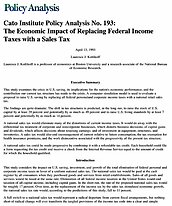This study examines the crisis in U.S. saving, its implications for the nation’s economic performance, and the contribution our current tax structure has made to the crisis. A computer simulation model is used to evaluate a proposal to raise U.S. saving by replacing all federal personaland corporate income taxes with a national retail sales tax.
The findings are quite dramatic. The shift in tax structures is predicted, in the long run, to raise the stock of U.S. capital by at least 29 percent and potentially by as much as 49 percent and to raise U.S. living standards by at least 7 percent and potentially by as much as 14 percent.
A national sales tax would eliminate many of the distortions of current income taxes. It would do away with the differential tax treatment of corporate and noncorporate businesses, which distorts business decisions; of capital gains and dividends, which affects decisions about retaining earnings; and of investment in equipment, structures, and inventories. A sales tax would also end encouragement of current relative to future consumption, the tax exemption for health insurance premiums, and the work disincentive associated with the progressivity of the present tax structure.
A national sales tax could be made progressive by combining it with a refundable tax credit. Each household could file a form requesting the tax credit and receive a check from the Internal Revenue Service equal to the amount of credit for which the household qualified.
About the Author

This work is licensed under a Creative Commons Attribution-NonCommercial-ShareAlike 4.0 International License.
